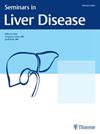肝脏免疫学、免疫治疗和肝癌:是时候重新思考了?
IF 4.3
3区 医学
Q1 GASTROENTEROLOGY & HEPATOLOGY
引用次数: 2
摘要
肝脏复杂的免疫系统在肿瘤监测中起着重要作用,但也部分解释了为什么目前的免疫疗法对肝癌效果不佳。主要以其耐受性而闻名,肝脏免疫库也包括具有肿瘤监视作用的不同装甲免疫细胞群。在健康人群中,这些因素共同作用,成功地识别恶性细胞并防止其增殖,从而阻止肿瘤的形成。当一线肝脏免疫监测系统失效时,由肥胖、感染或其他病理因素驱动的肝脏免疫功能受损,会导致原发性或继发性肝癌的发生。肿瘤的生长促进了肝脏正常的耐受性免疫环境,这也许可以解释为什么目前的免疫疗法不起作用。这篇综述探讨了复杂的局部肝脏免疫系统,希望找到潜在的治疗靶点,以最好地克服肝脏中的免疫屏障,创造一个不再敌视免疫治疗肝癌的环境。本文章由计算机程序翻译,如有差异,请以英文原文为准。
Liver Immunology, Immunotherapy, and Liver Cancers: Time for a Rethink?
The complex immune system of the liver has a major role in tumor surveillance, but also partly explains why current immune therapies are poorly effective against liver cancers. Known primarily for its tolerogenic capacity, the hepatic immune repertoire also comprises diverse populations of armored immune cells with tumor surveillant roles. In healthy people, these work together to successfully identify malignant cells and prevent their proliferation, thus halting tumor formation. When frontline hepatic immune surveillance systems fail, compromised hepatic immunity, driven by obesity, infection, or other pathological factors, allows primary or secondary liver cancers to develop. Tumor growth promotes the normal tolerogenic immunological milieu of the liver, perhaps explaining why current immunotherapies fail to work. This review explores the complex local liver immune system with the hope of identifying potential therapeutic targets needed to best overcome immunological barriers in the liver to create an environment no longer hostile to immunotherapy for the treatment of liver cancer.
求助全文
通过发布文献求助,成功后即可免费获取论文全文。
去求助
来源期刊

Seminars in liver disease
医学-胃肠肝病学
CiteScore
8.20
自引率
2.40%
发文量
38
期刊介绍:
Seminars in Liver Disease is a quarterly review journal that publishes issues related to the specialties of hepatology and gastroenterology.
As the premiere review journal in the field, Seminars in Liver Disease provides in-depth coverage with articles and issues focusing on topics such as cirrhosis, transplantation, vascular and coagulation disorders, cytokines, hepatitis B & C, Nonalcoholic Steatosis Syndromes (NASH), pediatric liver diseases, hepatic stem cells, porphyrias as well as a myriad of other diseases related to the liver. Attention is also given to the latest developments in drug therapy along with treatment and current management techniques. Seminars in Liver Disease publishes commissioned reviews. Unsolicited reviews of an exceptional nature or original articles presenting remarkable results will be considered, but case reports will not be published.
 求助内容:
求助内容: 应助结果提醒方式:
应助结果提醒方式:


